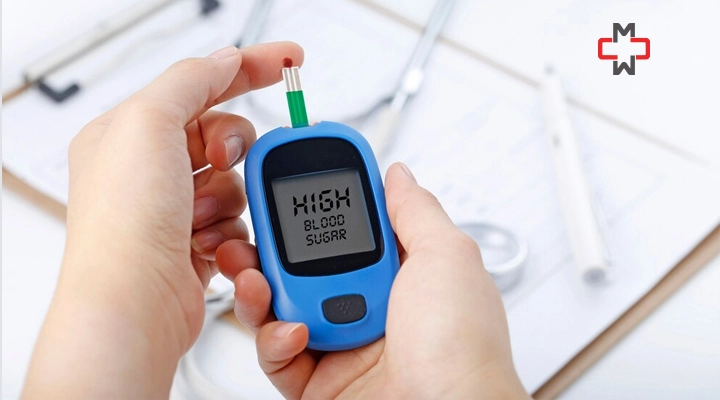Nerve Conduction Study
Body pain can make it tedious for you to carry out simple daily tasks, let alone relax or lie down comfortably. Chronic pain can be neuropathic in origin, meaning there could be nerve damage responsible for the constant, recurrent pain you are experiencing.
Neuropathic pain is often experienced as a burning, prickling, or tingling sensation; or chronic pain that can radiate to another, particularly larger, area of the body.
Before mistaking your nerve pain for muscular pain and resorting to over-the-counter painkillers for long periods of time, it is ideal to get diagnosed at your earliest to prevent further damage.
Manhattan Medical Arts prides itself on its staff of board-certified neurologists to carry out nerve conduction studies to diagnose the cause behind your nerve pain.


What is a Nerve
Conduction Study?
A Nerve Conduction Study is a diagnostic modality that ascertains the degree of damage to the nerve fibers. It is helpful in the diagnosis of both motor and sensory nerve dysfunction. It evaluates the speed with which an impulse is transmitted across the nerve fibers and bundles. It is often accompanied by paper tracing of electromyogram waves. The EMG or electromyogram aids in differentiating the origin of disease, whether it is a dysfunction of muscle fiber or nerve.
The Nerve Conduction Test is used to diagnose a variety of neurological and myopathic diseases, such as: Guillain Barre Syndrome, muscle dystrophies and myopathies like Duchenne Muscular Dystrophy, Peripheral Neuropathies, Carpal Tunnel syndrome, Charcot Marie Tooth syndrome, ALS, radiculopathies like herniated disc disease, sciatica, etc. NCS is also used to detect the reasons behind pain, numbness, and tingling around a part of the body, especially the periphery.
Nerve Conduction Testing Procedure
In the first component of the Nerve Conduction Study, electrodes, which are compact sensors, are placed on the skin overlying the affected area or the area to be tested. The second component comprises needles in the form of sensors which are inserted in the group of muscles to be tested.
The electrodes overlying the skin detect any changes when an electrical signal sends down the motor neurons whereas the needles in the muscle fibers detect the ability of the muscle fibers to contract.
With the help of an electrode, an electrical signal is delivered on the testing group of tissues. The rest of the electrodes placed on the person are used to detect the speed of the electrical signal and the time it takes for the impulse to reach one nerve fiber to the other, along with the time it takes for the muscles to contract.
The distance an electrical impulse covers is recorded and is compared with the normal values. If there is any discrepancy in the collected information, a dysfunction in the nerve or motor fibers is present.
How To Prepare For An EMG NCS Test
In order to prepare for the Nerve Conduction Test and the electromyography, one must bathe or take a shower on the day of the test and refrain from applying any lotions, creams or oils to the body.
The idea is that the body should be stripped of any oils or grease so that the electrodes can work smoothly. It is a quick 10-15 minutes test that can be done on an outpatient basis.
When appearing for the test, the patient will be given a hospital gown to change into while our neurologist marks the sites to be tested. The neurologist will then place two electrodes on the skin, one electrode will send an impulse, whereas, the second electrode attached at a calculated distance will record the speed of the impulse transmitted to it.
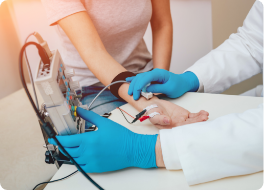
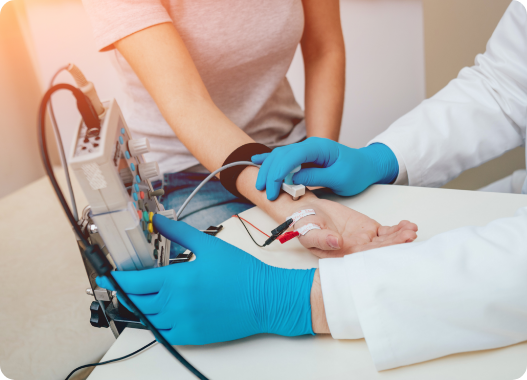
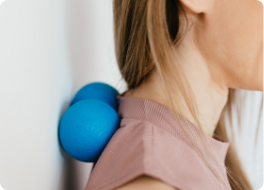
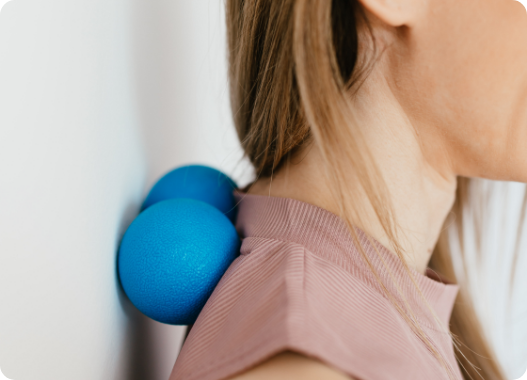
The test will be repeated on each and every nerve to be studied. There are generally no side effects to the test since the voltage of the electrical impulse is kept to the minimum, however, some patients might experience mild to moderate allergy to the gel used to attach the electrodes.
After booking an appointment for a Nerve Conduction test at Manhattan Medical Arts, our staff will inform you of the guidelines required to prepare for the study beforehand. We ensure a comfortable yet safe nerve conduction study so that we can narrow down the cause behind your pain for your ease.
Nerve Conduction Studies At
Manhattan Medical Arts
Manhattan Medical Arts offers state of the art technology along with its array of expert medical staff waiting to serve their patients. Electromyography and Nerve Conduction Studies services are available and accessible to all at Manhattan Medical Arts. We are offering the tests at reasonable, and patient friendly prices. We also have board certified physicians at disposal, should a patient require consultation.
At Manhattan Medical Arts, our board-certified and highly experienced neurologists are working day and night to provide all our clients the best of care and comfort at all our facilities with the utmost safety and assurance. Call us at 646-454-9000 or contact us online to book an appointment.
Latest Blog Posts
Making primary care accessible
